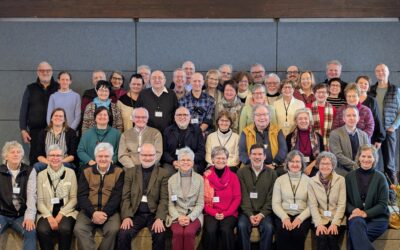 Many cities were united with one another by a network of Mariapolises that were held around the world this year, from Sicily, in Italy to Bolivia, from Macedonia to the United States. Each Mariapolis had its own personality, but all of them shared the same spirit, based on universal brotherhood and the building of a better and more just society. In Chicago, USA, our Muslim friends travelled without food or water because of Ramadan, so that they could take part in the Mariapolis for one day that was dedicated to interreligious dialogue. Experiences on love of neighbor were shared by families, including a Muslim couple and a Jewish and Catholic husband and wife. Diversity of religions and nations was also evident in Macedonia where the theme of the Mariapolis was “The other another me”. The choice of this title immediately heightened the communion among all, between young people and adults, among Muslims, Orthodox and Catholics, between Macedonians and Albanians and also with those who arrived from Kosovo. The splendid natural surroundings, the hiking trails and sport activities provided opportunities to be open to one another and enter into the life stories of others.
Many cities were united with one another by a network of Mariapolises that were held around the world this year, from Sicily, in Italy to Bolivia, from Macedonia to the United States. Each Mariapolis had its own personality, but all of them shared the same spirit, based on universal brotherhood and the building of a better and more just society. In Chicago, USA, our Muslim friends travelled without food or water because of Ramadan, so that they could take part in the Mariapolis for one day that was dedicated to interreligious dialogue. Experiences on love of neighbor were shared by families, including a Muslim couple and a Jewish and Catholic husband and wife. Diversity of religions and nations was also evident in Macedonia where the theme of the Mariapolis was “The other another me”. The choice of this title immediately heightened the communion among all, between young people and adults, among Muslims, Orthodox and Catholics, between Macedonians and Albanians and also with those who arrived from Kosovo. The splendid natural surroundings, the hiking trails and sport activities provided opportunities to be open to one another and enter into the life stories of others.  The motto of the Mariapolis in Lithuania was “Being bridges.” One bridge was built with Syria by inviting everyone to pray the time out for peace each day and collecting money for areas ravaged by war. Nearly 459 euros were collected. Many other bridges were built among people of different languages and cultures: there were Estonians, Latvians and Lithuanians. The language barrier was overcome by speaking Russian, which is a common language among adults, while the young people spoke English among themselves. Language was never a barrier on the other side of the world in Indonesia where Indonesian, Chinese and English were the languages used by the 125 participants of the Mariapolis in Yogyakarta. And so a bit of the world has lived an extraordinary experience, the same experience that is repeated when evangelical love lies at the basis of every relationship. In Argentina the motto of the Mariapolis was “An experience of society renewed” to underscore that it is possible to transform society if we begin from ourselves, from our surroundings, remaining faithful in small things. From children to elderly, everyone experienced the various expressions of love: tangible, joyful, true, concrete love.
The motto of the Mariapolis in Lithuania was “Being bridges.” One bridge was built with Syria by inviting everyone to pray the time out for peace each day and collecting money for areas ravaged by war. Nearly 459 euros were collected. Many other bridges were built among people of different languages and cultures: there were Estonians, Latvians and Lithuanians. The language barrier was overcome by speaking Russian, which is a common language among adults, while the young people spoke English among themselves. Language was never a barrier on the other side of the world in Indonesia where Indonesian, Chinese and English were the languages used by the 125 participants of the Mariapolis in Yogyakarta. And so a bit of the world has lived an extraordinary experience, the same experience that is repeated when evangelical love lies at the basis of every relationship. In Argentina the motto of the Mariapolis was “An experience of society renewed” to underscore that it is possible to transform society if we begin from ourselves, from our surroundings, remaining faithful in small things. From children to elderly, everyone experienced the various expressions of love: tangible, joyful, true, concrete love.
Take care of relationships
Take care of relationships




0 Comments